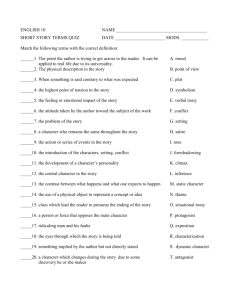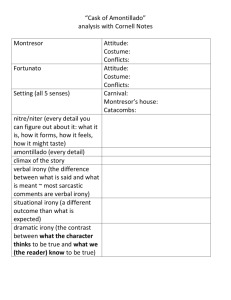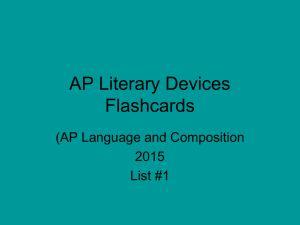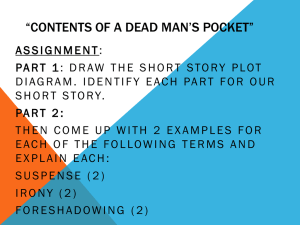The Veldt – Comprehension Questions
advertisement
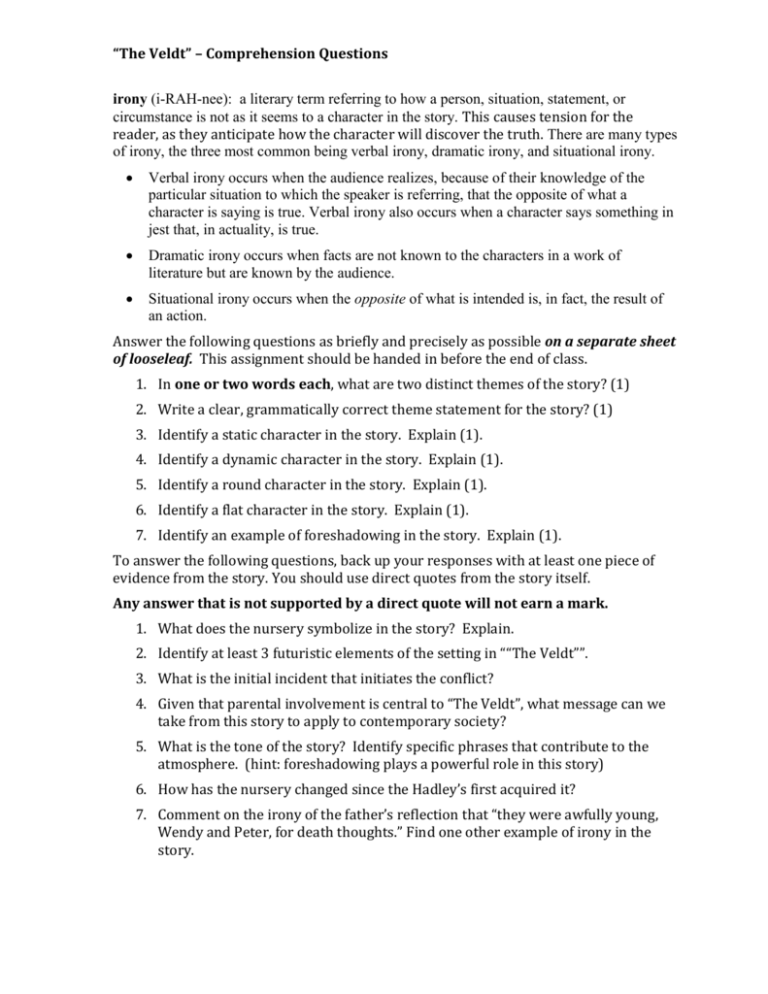
“The Veldt” – Comprehension Questions irony (i-RAH-nee): a literary term referring to how a person, situation, statement, or circumstance is not as it seems to a character in the story. This causes tension for the reader, as they anticipate how the character will discover the truth. There are many types of irony, the three most common being verbal irony, dramatic irony, and situational irony. Verbal irony occurs when the audience realizes, because of their knowledge of the particular situation to which the speaker is referring, that the opposite of what a character is saying is true. Verbal irony also occurs when a character says something in jest that, in actuality, is true. Dramatic irony occurs when facts are not known to the characters in a work of literature but are known by the audience. Situational irony occurs when the opposite of what is intended is, in fact, the result of an action. Answer the following questions as briefly and precisely as possible on a separate sheet of looseleaf. This assignment should be handed in before the end of class. 1. In one or two words each, what are two distinct themes of the story? (1) 2. Write a clear, grammatically correct theme statement for the story? (1) 3. Identify a static character in the story. Explain (1). 4. Identify a dynamic character in the story. Explain (1). 5. Identify a round character in the story. Explain (1). 6. Identify a flat character in the story. Explain (1). 7. Identify an example of foreshadowing in the story. Explain (1). To answer the following questions, back up your responses with at least one piece of evidence from the story. You should use direct quotes from the story itself. Any answer that is not supported by a direct quote will not earn a mark. 1. What does the nursery symbolize in the story? Explain. 2. Identify at least 3 futuristic elements of the setting in ““The Veldt””. 3. What is the initial incident that initiates the conflict? 4. Given that parental involvement is central to “The Veldt”, what message can we take from this story to apply to contemporary society? 5. What is the tone of the story? Identify specific phrases that contribute to the atmosphere. (hint: foreshadowing plays a powerful role in this story) 6. How has the nursery changed since the Hadley’s first acquired it? 7. Comment on the irony of the father’s reflection that “they were awfully young, Wendy and Peter, for death thoughts.” Find one other example of irony in the story. “The Veldt” – Comprehension Questions “The Veldt” – Comprehension Questions Setting and Atmosphere 1. Identify the futuristic elements of the setting in ““The Veldt””. a. The house is self cleaning, washing, entertaining, and is even a tie-er of shoes. They can take trips by rocket, and the children’s nursery is a futuristic mental projection apparatus. Time is noted as the future, as the story begins. 2. What message can we take from this story to apply to contemporary society? a. Materialism has negative consequences if taken to an extreme. Time spent working and in self indulgence is time taken from raising and modeling to your children. If we allow other influences to raise our children, they will not retain our values. We must consider the consequences of (any) actions; and set limits accordingly. The children in this story are no more than a natural product of their environment, literally, children raised by lions (which are a projection of their own instincts). 3. What is the tone of the story? Identify specific phrases and sentences to contribute to the atmosphere. a. The tone is ominous because the parents fear the children. b. There is “hatred here” 112. c. ”They realized why those screams sounded so familiar” 114. d. His wallet foreshadows their death. e. The children break into the nursery 109 f. There is a smell of blood and death/meat dripping from the lion’s mouths 105 g. Laughing and crying 103 h. Door shuddered on its hinges (foreshadows) 103 4. What is the problem that initiates the conflict? a. The parents finally decide to shut the room down, because of the ominous signs. 5. How has the nursery changed since the Hadley’s first acquired it? a. From playful and fun to ominus and primitive. “The Veldt” – Comprehension Questions 6. Comment on the irony of the father’s reflection that “they were awfully young, Wendy and Peter, for death thoughts.” Find one other example of irony in the story. a. “They’ll be down” (last page) b. “Its supposed to help them work off their neurosis” irony (i-RAH-nee): a literary term referring to how a person, situation, statement, or circumstance is not as it seems to a character in the story. This causes tension for the reader, as they anticipate how the character will discover the truth. There are many types of irony, the three most common being verbal irony, dramatic irony, and situational irony. Verbal irony occurs when the audience realizes, because of their knowledge of the particular situation to which the speaker is referring, that the opposite of what a character is saying is true. Verbal irony also occurs when a character says something in jest that, in actuality, is true. Dramatic irony occurs when facts are not known to the characters in a work of literature but are known by the audience. Situational irony occurs when the opposite of what is intended is, in fact, the result of an action.


